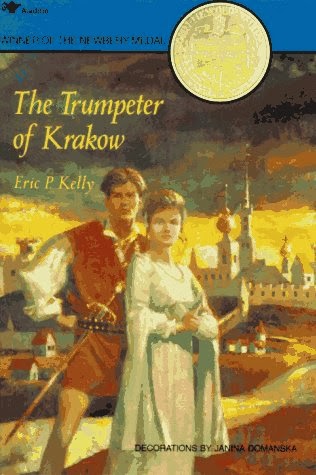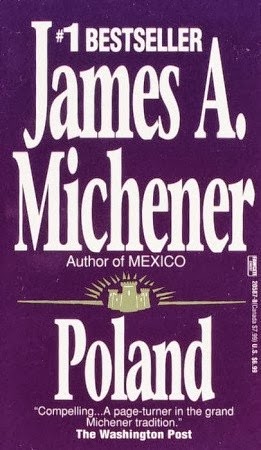When I think of books on Poland in English that describe the nature of Poland to outsiders (we non-Polish Americans) only two ‘literature’ books come to mind. I am intentionally omitting the broad category of research materials on the WWII time period as well as memoirs and non-fiction accounts entitled “I survived Auschwitz/Dachau/Bergen-Belsen/pick your concentration camp. “
 The Trumpeter of Krakow by Eric P. Kelly was first published in 1928 by Simon and Schuster, and republished in 1966. Though the book is nearly 90 years old, because it’s a fictional historical account of an alchemist in medieval Poland, the story doesn’t change. It also addresses the Hejnal, a trumpet tune played daily from the tower of St. Mary’s even today. The version may be urban legend – but heck remember it’s fiction based on history. The definition ‘fiction’ always allows the author artistic license. Today it would be classified as ‘YA’ or young adult fiction. I confess I read it several years ago; I remember it as interesting but I think young readers in 1926 had a higher reading capacity and vocabulary than today’s middle-school youth. It is age appropriate for anyone.
The Trumpeter of Krakow by Eric P. Kelly was first published in 1928 by Simon and Schuster, and republished in 1966. Though the book is nearly 90 years old, because it’s a fictional historical account of an alchemist in medieval Poland, the story doesn’t change. It also addresses the Hejnal, a trumpet tune played daily from the tower of St. Mary’s even today. The version may be urban legend – but heck remember it’s fiction based on history. The definition ‘fiction’ always allows the author artistic license. Today it would be classified as ‘YA’ or young adult fiction. I confess I read it several years ago; I remember it as interesting but I think young readers in 1926 had a higher reading capacity and vocabulary than today’s middle-school youth. It is age appropriate for anyone.  In 1929 the book earned the prestigious Newbery Medal that is awarded annually by the American Library Association for the most distinguished American children’s book published the previous year. In 2003 First Lady Laura Bush made an official gift of this book to the First Lady of Poland. If I recall correctly, the first lady of Poland was not aware the book existed. I consider any book written in English about Poland as directed to non-Poles – who are we non-Poles to teach citizens of a country their own history?
In 1929 the book earned the prestigious Newbery Medal that is awarded annually by the American Library Association for the most distinguished American children’s book published the previous year. In 2003 First Lady Laura Bush made an official gift of this book to the First Lady of Poland. If I recall correctly, the first lady of Poland was not aware the book existed. I consider any book written in English about Poland as directed to non-Poles – who are we non-Poles to teach citizens of a country their own history? The second book that should be required reading before a visit to Poland is Poland, by James A Michener. This book was published in 1983, 6 years before the downfall of communism. Michener takes Polish events and weaves them into a ‘fictional’ account – that frankly does read like a history lesson. Per Henry during our discussions “This author got everything exactly right.” I confess I started it a month before I left for Poland, and trudged through the first 268 pages of the thick paperback of 616 total pages. As I’ve said before, Polish history is complicated.
Both were written by Americans with a strong interest in Poland, who had spent considerable time in Poland, and invested resources to properly research history; so they got things correct. Both are novels;good historical novels give you a time and place for events – but exact facts must be culled and verified. The power of Poland at the time of publication is that it focused readers’ attention on Poland prior to the fall of communism.
At the time these were published, as well as today like when I planned this trip, people still ask Poland? Why Poland? I sometimes wonder if Poland has seriously considered a large marketing plan to the rest of the world – it’s certainly a beautiful country with much to offer.
